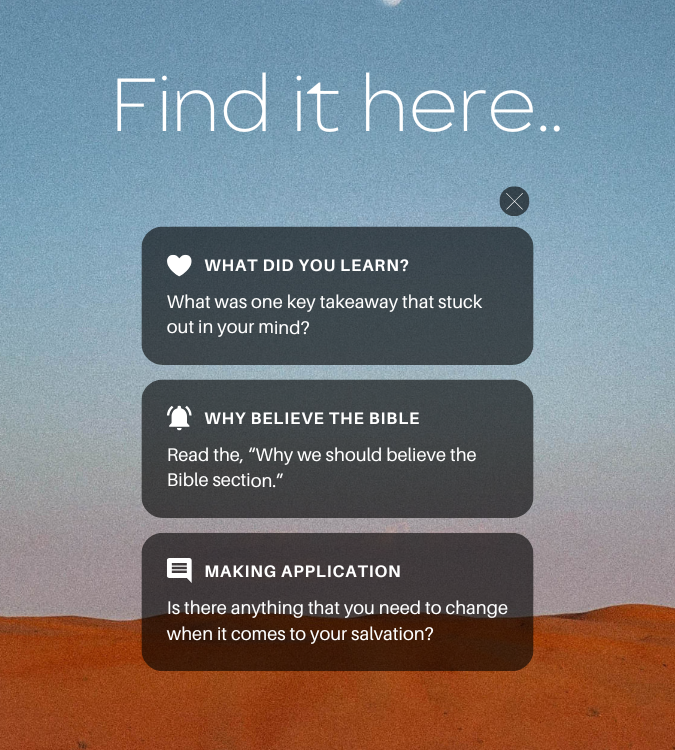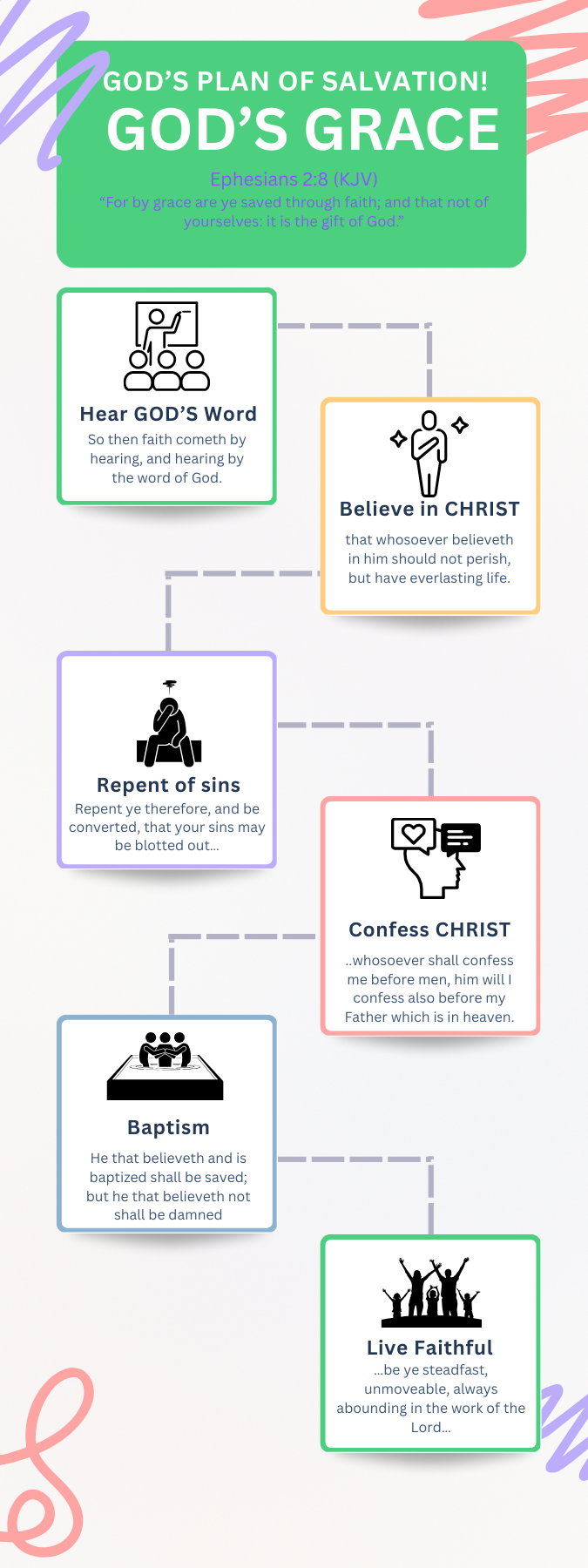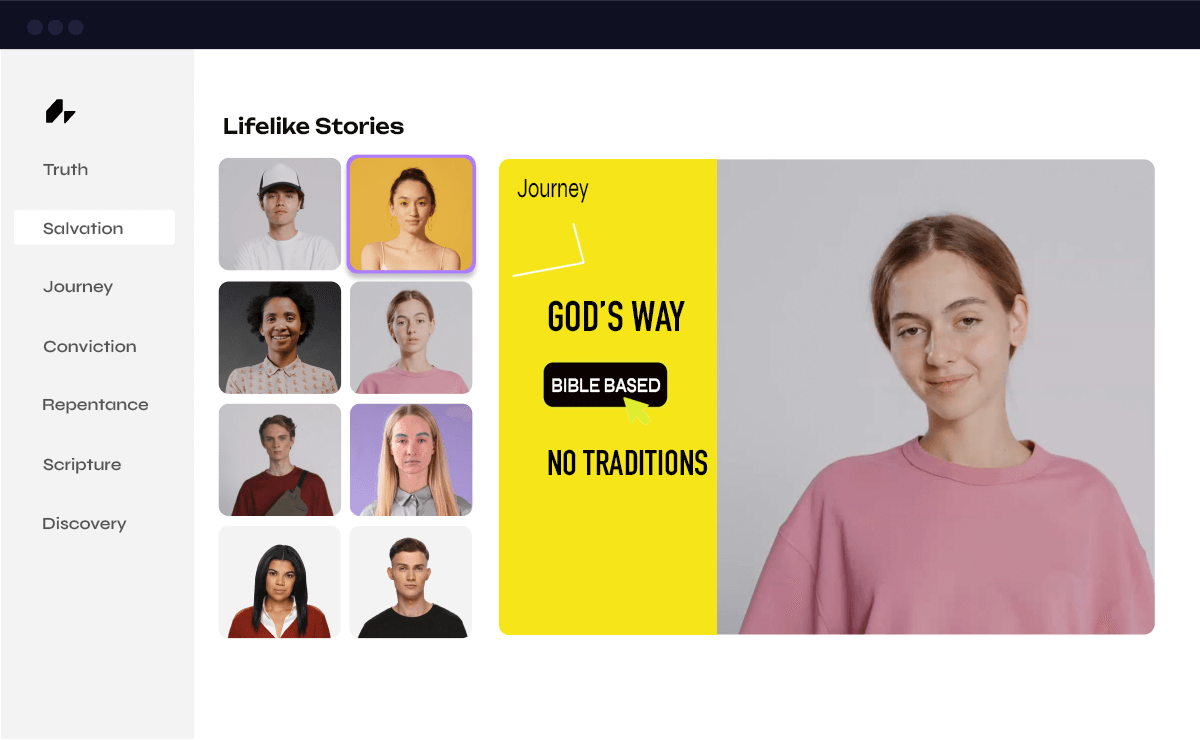What We Learn from the Video
What if the faith you've followed your whole life isn't fully what the Bible teaches? This video might inspire you to grab your Bible and start asking questions. The main message is straightforward: True faith requires personally questioning traditions by asking "What does the Bible say?" and obeying its answers over what you've always been taught. The speaker went through life following routines without deeper inquiry. Then, the question hit: What does the Bible actually say? Reading with fresh eyes revealed truths not shared from the pulpit. This led them to obey the gospel, leave tradition, and commit to Scripture alone.
In plain language, the video teaches that unquestioned teachings can keep you from the full Bible plan of salvation—hearing the Word, believing, repenting, confessing, baptism for remission of sins, and faithful living. It's not about rejecting your past; it's a persuasive call to prioritize God's Word. The speaker's journey shows how pulpits may miss key truths, like the truth about baptism as essential obedience (Acts 2:38), urging us to read for ourselves and act.
A direct quote that captures the video’s point: "One day that question hit me hard. What does the Bible say? I started reading with fresh eyes and I found answers I'd never heard from the pulpit." This highlights the awakening from passive acceptance to active discovery.
The video reminds us it's never too late to question and obey. Let it motivate you to explore the Bible plan of salvation today. Imagine uncovering hidden truths that transform your faith—what questions will you ask first?
Why We Should Believe the Bible
In the video, the speaker's unquestioned life changed when they asked "What does the Bible say?" and found fresh answers—proving Scripture's power to reveal truth over traditions. But why trust the Bible as your guide? Its trustworthiness of Scripture is backed by solid evidence, making it the reliable source for questioning and obeying. Let's explore key reasons, encouraging you to embrace God’s Word is truth as your foundation.
Fulfilled Prophecy: Accurate Predictions
The Bible's prophecies, like Micah's foretelling of Jesus' birthplace (Micah 5:2: "But you, O Bethlehem... from you shall come forth for me one who is to be ruler in Israel"), came true centuries later. This precision helped the speaker find unpulpited answers.
Historical Accuracy: Verified Events
Archaeology confirms Bible details, from Jericho's walls to ancient inscriptions. This authority of the Bible shows it's not myth—reliable for the speaker's fresh reading.
Eyewitness Testimony: Direct Accounts
Writers like John were eyewitnesses (1 John 1:1: "That which we have seen and heard we proclaim also to you"). Their testimonies provide credibility, as the speaker discovered truths "never heard from the pulpit."
Divine Inspiration: Unified Divine Message
The Bible's consistency across authors demonstrates inspiration (2 Timothy 3:16: "All Scripture is breathed out by God"). It empowered the speaker to obey over tradition.
View the Bible as the ultimate authority—it's factual and transformative. Let God’s Word is truth lead your questions, as it did the speaker.
How to Apply This Truth to My Life
The video's truth—that unquestioned traditions can miss Gospel answers, as the speaker discovered by asking "What does the Bible say?" and obeying—demands action. They left tradition for Scripture-only faith. This is about apply God’s Word to your Christian living through obedience to the gospel. Here are 3–5 specific steps, implied by the script, to question, read, and obey.
Step 1: Start Asking 'What Does the Bible Say?'
Like the speaker's turning point, question teachings by reading Scripture daily (2 Timothy 2:15). Compare to what you've heard—this builds obedience to the gospel.
Step 2: Read with Fresh Eyes
The script implies fresh reading revealed answers—approach the Bible without bias, noting new insights. Journal them to apply God’s Word personally.
Step 3: Obey Discovered Truths
Follow the speaker: Act on findings, like obeying the gospel through repentance and baptism (Acts 2:38). This ensures Christian living in truth.
Step 4: Leave Tradition for Scripture-Only
Commit to Bible authority, leaving misaligned practices. Join a group focused on obedience for support.
Step 5: Share Your Discoveries
Tell others, as the speaker did, to encourage questioning—fostering community in obedience to the gospel.
Modern scenario: Alex, raised religious like the speaker, followed family traditions but felt unfulfilled in his job and relationships. After a video like this, he applied the truth by asking "What does the Bible say?" and studying independently. Discovering the Bible plan of salvation, Alex obeyed through baptism, leaving incomplete teachings. The outcome? Purpose replaced emptiness; he mentored youth, mended family ties, and found joy in Christian living—transforming a stagnant life into one of growth.
What This Denomination Teaches about Salvation
The video's speaker followed taught traditions "without ever asking what the Bible actually says," only to find pulpit messages didn't fully align with Scripture, implying a mainline Protestant denomination like Presbyterianism or Lutheranism, where structured teachings and creeds can overshadow personal Bible study. While not explicitly named, the context of unquestioned routines and later discovery of "answers I'd never heard from the pulpit" fits groups such as the Presbyterian Church (USA) or Evangelical Lutheran Church in America, emphasizing confessional faith. Drawing from factual research (e.g., the Westminster Confession for Presbyterians or Augsburg Confession for Lutherans), we'll respectfully outline this denominational view of salvation. This is based on common teachings, noting how the speaker's fresh reading led to leaving tradition for obedience. We'll stay factual, using the script's implication of incomplete pulpit answers.
Core Beliefs: Salvation by Grace Through Faith
In Presbyterian and Lutheran traditions, salvation is rooted in God's sovereign grace received through faith alone (sola fide), one of the Reformation's five solas. This denominational view of salvation holds that humans are totally depraved due to original sin but are justified by Christ's atonement, not works (Ephesians 2:8-9: "For by grace you have been saved through faith. And this is not your own doing; it is the gift of God, not a result of works"). Faith is a gift from God, often nurtured in structured worship and catechism, providing assurance amid life's uncertainties. The speaker's unquestioned life reflects this emphasis on confessional faith, where salvation is seen as God's election and preservation, fostering a sense of security without always prompting personal Bible inquiry.
The Role of the Sinner’s Prayer and Confession
While not always central like in Evangelicalism, these denominations value confessional acts, such as affirming creeds or a sinner’s prayer in conversion moments, drawing from Romans 10:9: "If you confess with your mouth that Jesus is Lord... you will be saved." Salvation is initiated by God's call, with public confession in worship reinforcing it. Research shows Presbyterians, for example, stress covenant theology, where faith is communal and confessional. The script doesn't quote teachings directly, but the speaker's reference to "what I was taught" and pulpit silence on certain answers suggests a setting where creeds guide understanding, sometimes limiting fresh Scriptural exploration.
Water Baptism: Meaning and Practice
On water baptism meaning, these denominations view it as a sacrament sealing God's covenant grace, often administered to infants by sprinkling or pouring (Matthew 28:19). In Lutheranism, it's a means of grace conferring faith and forgiveness; in Presbyterianism, it's a sign of inclusion in the covenant community, not necessarily regenerative for adults but essential for church life. It's tied to salvation as God's promise, but not the sole moment of forgiveness—grace is ongoing. Respectfully, this provides a nurturing framework, as in the speaker's unquestioned routines, emphasizing God's initiative over individual steps.
Assurance and Perseverance
Assurance comes from God's promises and sacraments, with doctrines like perseverance of the saints (in Reformed traditions) ensuring the elect remain saved. Faith is lived out in community, ethics, and service, reflecting the loving home the speaker described.
Differences from the New Testament
Factually and respectfully, this view differs from the New Testament in key ways. The NT emphasizes personal, adult obedience to the Gospel, including belief followed by immersion baptism for remission of sins (Acts 2:38: "Repent and be baptized... for the forgiveness of your sins"), not infant sprinkling or confessional emphasis without full steps. While faith alone is vital, Scripture links it to works as evidence (James 2:24: "A person is justified by works and not by faith alone"). The sinner’s prayer is a modern construct; NT conversion involves hearing, believing, repenting, confessing, and baptism (Acts 8:35-38).
Perseverance is encouraged, but warnings about falling away (Hebrews 6:4-6) suggest vigilance, not automatic security. The script highlights this: "I found answers I'd never heard from the pulpit," implying teachings omitted full obedience. The video persuades: While this denomination offers structured grace, aligning with the NT, as the speaker did, reveals a direct, obedient path.
In the video's context, this teaching shaped the speaker's loving home, but fresh Bible reading led to change. It's a tradition of depth and community, yet invites personal verification.
What the Bible Teaches about Salvation
The video's narrative—the speaker's unquestioned life of taught traditions until asking "What does the Bible say?" and finding unpulpited answers, leading to obedience and leaving tradition—echoes the vital question: What must I do to be saved? (Acts 16:30). The Bible responds with the New Testament plan of salvation, a clear, transformative path that prioritizes personal obedience over inherited routines. This isn't to dismiss a loving upbringing; it's to embrace God’s Word is truth, as the speaker did when they "started reading with fresh eyes" and obeyed the gospel. The Bible way to be saved involves hearing the Word, believing, repentance, confession, baptism for the remission of sins, and living faithfully—steps that turn passive faith into active commitment. Unlike pulpit omissions the speaker noted, this plan is comprehensive and empowering. We'll walk through each step with practical, persuasive explanations, showing how it addresses the video's theme of discovering fresh truths. Key verses, including those implying the need for Bible-only obedience, will guide us, revealing why this New Testament plan of salvation leads to the freedom and real faith the speaker found.
Step 1: Hearing the Word (Romans 10:17)
The Bible way to be saved starts with hearing God's message, the foundational act that ignites faith. Romans 10:17 declares: "So faith comes from hearing, and hearing through the word of Christ." This means actively listening to Scripture, letting it penetrate and challenge. In the video, the speaker never asked "What does the Bible say?" until later, missing fresh answers— but when they did, it transformed them. Why practical and persuasive? Hearing reveals hidden truths, as Isaiah 55:11 promises: "So shall my word be that goes out from my mouth; it shall not return to me empty." Without it, you stay in traditions, as the speaker did for most of life. Apply by reading a chapter daily—use apps for audio during commutes. Persuasively, this step is the spark; it turned the speaker's passive routine into active pursuit. In what must I do to be saved?, hearing is essential—it exposes pulpit gaps and builds the faith for deeper steps.
Step 2: Believing (Mark 16:16)
Belief is trusting Jesus' sacrifice for your sins. Mark 16:16 states: "Whoever believes and is baptized will be saved, but whoever does not believe will be condemned." It's heartfelt acceptance, not just intellectual nod. The speaker had a taught faith but found it misaligned—belief must lead to obedience. Why practical and persuasive? It offers hope (John 3:16: "Whoever believes in him should not perish"). Apply by studying evidences like the resurrection (1 Corinthians 15). This step in the New Testament plan of salvation bridges hearing to repentance.
Step 3: Repentance (Acts 2:38)
Repentance is turning from sin to God. Acts 2:38 commands: "Repent and be baptized... for the forgiveness of your sins." It's a full shift. The speaker obeyed after fresh reading. Why practical? List sins and change (Luke 13:3: "Unless you repent, you will all likewise perish"). Persuasively, it brings renewal.
Step 4: Confession (Romans 10:9-10)
Confession declares Jesus Lord. Romans 10:9-10 says: "If you confess with your mouth... you will be saved." It's public. The speaker confessed by leaving tradition. Why practical? Share with others (Matthew 10:32). It's key in what must I do to be saved?.
Step 5: Baptism for the Remission of Sins (Acts 2:38; 1 Peter 3:21)
Baptism forgives. Acts 2:38 links it, 1 Peter 3:21 adds: "Baptism... now saves you." This is the truth about baptism—immersion into Christ (Romans 6:3-4). The speaker was baptized after discovery. Why practical? Seek it upon confession. Persuasively, it's the start of real faith.
Step 6: Living Faithfully (Revelation 2:10)
Faithful living endures. Revelation 2:10 urges: "Be faithful unto death." It's ongoing. The speaker "finally felt" it after obedience. Why practical? Build habits like prayer (Hebrews 10:24-25). It's the fruit of salvation.
This plan is God's design (Titus 3:5). The video persuades: Follow it for truth.
In heartfelt appeal: Friend, the New Testament plan of salvation is your path to real faith—hear, believe, repent, confess, be baptized, and live faithfully now. Choose truth, as the speaker did, and walk with God.
Background of the Denomination
The video's speaker followed "what I was taught without ever asking what the Bible actually says," only to find pulpit answers incomplete, implying a denomination like Presbyterianism, where confessional teachings and structured doctrine can overshadow personal Bible inquiry. This fits traditions such as the Presbyterian Church (USA), emphasizing creeds and clergy-led instruction. Below is a brief, factual history of Presbyterianism, drawn from sources like the Presbyterian Historical Society and the Westminster Confession. We'll cover origins, founders, and core doctrines, referencing events tied to their salvation teachings that stress predestination and grace, which the speaker later questioned through fresh Scripture reading.
Origins and Founders
The origin of Presbyterian teachings dates to the 16th century during the Protestant Reformation. Founded by John Calvin in the 1530s in Geneva, Switzerland, as part of Reformed theology. Calvin, a French theologian, built on Martin Luther's ideas, emphasizing God's sovereignty. John Knox brought it to Scotland in the 1550s, establishing the Church of Scotland in 1560. In America, Scottish and Irish immigrants formed the first presbytery in 1706 in Philadelphia, Pennsylvania. This history of Presbyterianism grew from a desire for church governance by elders (presbyters) and doctrinal purity, free from hierarchical bishops.
Key Historical Events
The Westminster Assembly (1643-1649) in London, England, produced the Westminster Confession, defining salvation as predestined by God's grace, influencing teachings on assurance without works. This event tied to their view of salvation as God's election, debated in the Synod of Dort (1618-1619) in the Netherlands, which affirmed "TULIP" (Total depravity, Unconditional election, Limited atonement, Irresistible grace, Perseverance of the saints). The Great Awakening in 18th-century America split Presbyterians over revivalism, reinforcing personal experience in salvation while maintaining confessional standards—events that shaped pulpit-focused teaching, as the speaker noted omissions.
Core Doctrines
Presbyterians hold to Bible-centered beliefs like the sovereignty of God, salvation by grace through faith (Ephesians 2:8), and the authority of creeds alongside Scripture. Church government is by elected elders, with sacraments like baptism and communion as signs of grace. Salvation is a divine act, with predestination ensuring the elect's perseverance. This provides a structured faith, but as the speaker found, it can limit fresh Bible exploration.
Factually, this background fostered the speaker's unquestioned life, but their search revealed more. It's a thoughtful history of Presbyterianism, promoting order and grace, yet the video encourages personal Bible study beyond traditions.
Key Bible Passages to Read and Study
The video's emphasis on asking "What does the Bible say?" and finding unpulpited answers leading to obedience highlights crucial Bible verses about salvation. These Scriptures for eternal life encourage questioning traditions and embracing Gospel truth, answering what must I do to be saved? with steps for transformation. Below is a list of 10 relevant verses, with short explanations tied to the video. They focus on personal Bible study over taught routines, persuading us to read with "fresh eyes" like the speaker for discovery and obedience.
- Romans 10:17: "So faith comes from hearing, and hearing through the word of Christ." This starts salvation with hearing Scripture, as the speaker did by reading freshly—key Bible verse about salvation for questioning traditions.
- Mark 16:16: "Whoever believes and is baptized will be saved." Links belief and baptism, urging obedience the speaker found missing from the pulpit—essential Scripture for eternal life.
- Acts 2:38: "Repent and be baptized... for the forgiveness of your sins." Commands repentance and baptism, tying to the speaker's obedience after discovery—vital for the Bible way to be saved.
- Romans 10:9-10: "If you confess with your mouth that Jesus is Lord... you will be saved." Emphasizes confession with belief, but the speaker shows it must follow fresh Bible answers—core Bible verse about salvation.
- 1 Peter 3:21: "Baptism... now saves you... through the resurrection of Jesus Christ." Reveals baptism's saving role, aligning with truths the speaker never heard—clarifies the truth about baptism for eternal life.
- Revelation 2:10: "Be faithful unto death, and I will give you the crown of life." Calls for enduring faithfulness after obedience, as the speaker followed Bible-only—promises eternal life.
- 2 Timothy 2:15: "Do your best to present yourself to God as one approved, a worker who has no need to be ashamed, rightly handling the word of truth." Urges personal Bible study, like the speaker's fresh eyes—relevant Scripture for eternal life for avoiding shame.
- Acts 17:11: "They received the word with all eagerness, examining the Scriptures daily to see if these things were so." Praises daily examination, persuading the speaker-like questioning— a Bible verse about salvation for truth-seeking.
- John 5:39: "You search the Scriptures because you think that in them you have eternal life; and it is they that bear witness about me." Points to Scriptures testifying of Jesus, encouraging fresh reading for eternal life over pulpit limits.
- Psalm 119:105: "Your word is a lamp to my feet and a light to my path." Describes Scripture as guiding light, tying to the speaker's discovery of unpulpited answers—essential for navigating eternal life.
These Bible verses about salvation are tools for inquiry; study them to uncover truths like the speaker. The video shows their impact—let these Scriptures for eternal life guide you to obedience.
Common Misunderstandings about Salvation
The video's speaker followed teachings "without ever asking what the Bible actually says," only to find pulpit omissions, exposing false teachings about salvation like unquestioned traditions over personal obedience. Many misconceptions about grace assume taught routines save without Bible alignment. Below, we'll identify 4-5 common errors, explain them factually, and correct each with Scripture. Tied to the video, these address the speaker's discovery: "I started reading with fresh eyes and I found answers I'd never heard from the pulpit." This persuades us to embrace the truth about baptism and question for truth.
Misunderstanding 1: Faith Only Saves, Without Questioning
Some believe faith only from taught traditions saves, without personal Bible inquiry. This misconception about grace discourages questioning. The speaker lived this. Correction: Faith involves searching. Acts 17:11 says: "Examining the Scriptures daily to see if these things were so." The script rebuts: The speaker found unpulpited answers through fresh reading.
Misunderstanding 2: Baptism Is Optional, Not Essential
Many view baptism as optional or symbolic, not required for forgiveness. This false teaching about salvation relies on tradition. The speaker obeyed after discovery. Correction: Baptism saves. Acts 2:38 commands: "Repent and be baptized... for the forgiveness of your sins." The video rebuts: The speaker "obeyed the gospel," revealing the truth about baptism beyond pulpit silence.
Misunderstanding 3: Saved Before Personal Obedience
People think salvation happens through taught faith, without individual action. This misconception about grace delays obedience. The speaker never asked until later. Correction: Obedience is key. James 1:22 says: "Be doers of the word, and not hearers only." The script rebuts: "I obeyed the gospel, left the tradition behind."
Misunderstanding 4: Universalism—All Teachings Lead to Salvation
Universalism claims any taught faith saves, without Bible verification. This false teaching about salvation ignores alignment. It could explain the speaker's delay. Correction: Salvation is through truth. John 8:32 says: "You will know the truth, and the truth will set you free." The video rebuts with the shift to "follow the Bible only."
Misunderstanding 5: Grace Excuses Unquestioned Traditions
Some twist grace to justify traditions without Bible checks. This misconception about grace breeds complacency. The speaker followed without asking. Correction: Grace teaches inquiry. 2 Timothy 3:16-17 says: "All Scripture is... profitable for teaching... that the man of God may be complete." The script rebuts: Fresh eyes found answers "never heard from the pulpit."
Correct these for true salvation.
Real-Life Examples of Changed Lives
The video's speaker questioned traditions by asking "What does the Bible say?" and obeyed the gospel, leaving behind incomplete teachings. This shows discovery leads to transformation. Below are one or two short Christian testimonies of similar awakenings, illustrating a changed life through the gospel.
Testimony 1: From Routine to Revelation
Emily followed family teachings without question, attending church faithfully. Like the speaker, asking "What does the Bible say?" revealed pulpit gaps. She studied, repented, and was baptized (Acts 2:38). Her changed life through the gospel brought purpose—leading studies instead of routines. Emily's Christian testimony shares: "Fresh eyes changed everything."
Testimony 2: A Seeker's Shift
Tom accepted pulpit words blindly until doubt hit. Echoing the video, Bible reading uncovered new answers. He obeyed, leaving tradition for Scripture-only. His changed life through the gospel ended emptiness; he now evangelizes. Tom's Christian testimony inspires: "I follow the Bible only now."
Just as the speaker found fresh answers by questioning and obeying, these stories prove that asking 'What does the Bible say?' unlocks a vibrant, truth-filled life with God.
Why Urgency Matters in Responding to the Gospel
The video's speaker went "through most of my life" without questioning traditions, only to discover fresh Biblical answers later—this delay underscores the urgency of salvation. Don't postpone responding to the Gospel; the time to ask "What does the Bible say?" and obey is now. This section stresses why, drawing from Scripture and the video's appeal to leave unquestioned routines for truth. It's Bible-focused and persuasive: Today is the day to examine, obey, and do not delay obeying the gospel, embracing the fresh eyes and freedom the speaker found.
Life's Brevity and Unpredictability
We can't assume endless time. James 4:14 warns: "Yet you do not know what tomorrow will bring. What is your life? For you are a mist that appears for a little time and then vanishes." In the video, the speaker delayed for most of life, following teachings without asking key questions—what if death or hardship had intervened? The urgency of salvation is real; opportunities fade like mist. Persuasively, consider the rich fool in Luke 12:16-21, who planned for years but died that night. Do not delay obeying the gospel—start questioning today, as the speaker's late discovery shows the cost of waiting.
God's Call to Act in the Present Moment
Scripture emphasizes now as the time for decision. 2 Corinthians 6:2 declares: "For he says, 'In a favorable time I listened to you, and in a day of salvation I have helped you.' Behold, now is the favorable time; behold, now is the day of salvation." This ties to the video's appeal: The speaker notes, "One day that question hit me hard. What does the Bible say?"—a direct call to immediate inquiry and obedience. Why urgent? Hearts harden in tradition (Hebrews 3:13: "Exhort one another every day... that none of you may be hardened by the deceitfulness of sin"). The urgency of salvation prevents this, inviting fresh reading and action. The script warns implicitly of wasted years without questioning, appealing to "follow the Bible only" now.
Warnings and Appeals from the Video
The video includes a subtle warning through the speaker's regret: "I went through most of my life doing what I was taught without ever asking what the Bible actually says." This appeals to viewers—do not delay obeying the gospel, or risk missing unpulpited truths. Today is the day to respond, as the speaker did by leaving tradition after discovery.
Practical Reasons to Respond Urgently
In practice, the urgency of salvation means auditing your faith now—read a verse tonight and pray for clarity. Seek baptism if Scripture calls for it (Acts 2:38). Lives change when people act promptly, breaking tradition's hold. Today is the day to do not delay obeying the gospel—the rewards are eternal.
The urgency of salvation is God's merciful invitation—respond now.
Questions to Ask Yourself After Watching
The video's awakening—asking "What does the Bible say?" after years of unquestioned traditions and choosing obedience—prompts reflection on your eternal destiny. Am I saved per the Bible truth about salvation? Below are 5–7 questions to encourage personal examination, like the speaker's fresh-eyed discovery. Use them to pray and journal, moving from tradition to truth.
- Have I ever asked 'What does the Bible say?' about my beliefs? Reflect on the Bible truth about salvation—like the speaker, does unquestioned teaching affect my eternal destiny?
- Do my taught traditions align with Scripture? Am I saved if pulpit answers miss key truths, as the speaker found?
- What fresh insights might Bible reading reveal? Consider the Bible truth about salvation—am I saved without personal obedience?
- Am I delaying a deeper Gospel response? The speaker obeyed after questioning—how does this impact my eternal destiny?
- Is my faith Bible-only or tradition-bound? Am I saved following incomplete teachings, or must I leave them behind?
- How can I apply fresh Bible answers today? Think about baptism and obedience—what holds back my Bible truth about salvation?
- What if my assumptions are wrong? Pray over your eternal destiny—let the Bible truth about salvation guide you to freedom.
These questions lead to transformation.
Next Steps for Learning More
Inspired by the video's speaker who questioned traditions by asking "What does the Bible say?" and obeyed the gospel? Take action to explore fresh truths and learn how to be saved through Scripture. These steps help you move from unquestioned routines to Bible-only faith.
Join a Free Bible Study
Begin with a free Bible study on Gospel obedience, like the speaker's discovery. Online or local groups read with fresh eyes, helping you learn how to be saved beyond pulpit limits—sign up for sessions today.
Read More Articles and Resources
Dive into articles on the truth about baptism and NT salvation. Sites like BibleStudyTools offer free reads to learn how to be saved—start with one on Acts for practical insights.
Contact Us for Support
Visit AreUSaved.com and use the chatbot for instant Bible answers. Or check the contact page for a mentor-led free Bible study—share your questions to learn how to be saved personally.
Act now—your fresh start awaits.
What We Learn from the Video
What if the faith you've followed your whole life isn't fully what the Bible teaches? This video might inspire you to grab your Bible and start asking questions. The main message is straightforward: True faith requires personally questioning traditions by asking "What does the Bible say?" and obeying its answers over what you've always been taught. The speaker went through life following routines without deeper inquiry. Then, the question hit: What does the Bible actually say? Reading with fresh eyes revealed truths not shared from the pulpit. This led them to obey the gospel, leave tradition, and commit to Scripture alone.
In plain language, the video teaches that unquestioned teachings can keep you from the full Bible plan of salvation—hearing the Word, believing, repenting, confessing, baptism for remission of sins, and faithful living. It's not about rejecting your past; it's a persuasive call to prioritize God's Word. The speaker's journey shows how pulpits may miss key truths, like the truth about baptism as essential obedience (Acts 2:38), urging us to read for ourselves and act.
A direct quote that captures the video’s point: "One day that question hit me hard. What does the Bible say? I started reading with fresh eyes and I found answers I'd never heard from the pulpit." This highlights the awakening from passive acceptance to active discovery.
The video reminds us it's never too late to question and obey. Let it motivate you to explore the Bible plan of salvation today. Imagine uncovering hidden truths that transform your faith—what questions will you ask first?
Why We Should Believe the Bible
In the video, the speaker's unquestioned life changed when they asked "What does the Bible say?" and found fresh answers—proving Scripture's power to reveal truth over traditions. But why trust the Bible as your guide? Its trustworthiness of Scripture is backed by solid evidence, making it the reliable source for questioning and obeying. Let's explore key reasons, encouraging you to embrace God’s Word is truth as your foundation.
Fulfilled Prophecy: Accurate Predictions
The Bible's prophecies, like Micah's foretelling of Jesus' birthplace (Micah 5:2: "But you, O Bethlehem... from you shall come forth for me one who is to be ruler in Israel"), came true centuries later. This precision helped the speaker find unpulpited answers.
Historical Accuracy: Verified Events
Archaeology confirms Bible details, from Jericho's walls to ancient inscriptions. This authority of the Bible shows it's not myth—reliable for the speaker's fresh reading.
Eyewitness Testimony: Direct Accounts
Writers like John were eyewitnesses (1 John 1:1: "That which we have seen and heard we proclaim also to you"). Their testimonies provide credibility, as the speaker discovered truths "never heard from the pulpit."
Divine Inspiration: Unified Divine Message
The Bible's consistency across authors demonstrates inspiration (2 Timothy 3:16: "All Scripture is breathed out by God"). It empowered the speaker to obey over tradition.
View the Bible as the ultimate authority—it's factual and transformative. Let God’s Word is truth lead your questions, as it did the speaker.
How to Apply This Truth to My Life
The video's truth—that unquestioned traditions can miss Gospel answers, as the speaker discovered by asking "What does the Bible say?" and obeying—demands action. They left tradition for Scripture-only faith. This is about apply God’s Word to your Christian living through obedience to the gospel. Here are 3–5 specific steps, implied by the script, to question, read, and obey.
Step 1: Start Asking 'What Does the Bible Say?'
Like the speaker's turning point, question teachings by reading Scripture daily (2 Timothy 2:15). Compare to what you've heard—this builds obedience to the gospel.
Step 2: Read with Fresh Eyes
The script implies fresh reading revealed answers—approach the Bible without bias, noting new insights. Journal them to apply God’s Word personally.
Step 3: Obey Discovered Truths
Follow the speaker: Act on findings, like obeying the gospel through repentance and baptism (Acts 2:38). This ensures Christian living in truth.
Step 4: Leave Tradition for Scripture-Only
Commit to Bible authority, leaving misaligned practices. Join a group focused on obedience for support.
Step 5: Share Your Discoveries
Tell others, as the speaker did, to encourage questioning—fostering community in obedience to the gospel.
Modern scenario: Alex, raised religious like the speaker, followed family traditions but felt unfulfilled in his job and relationships. After a video like this, he applied the truth by asking "What does the Bible say?" and studying independently. Discovering the Bible plan of salvation, Alex obeyed through baptism, leaving incomplete teachings. The outcome? Purpose replaced emptiness; he mentored youth, mended family ties, and found joy in Christian living—transforming a stagnant life into one of growth.
What This Denomination Teaches about Salvation
The video's speaker followed taught traditions "without ever asking what the Bible actually says," only to find pulpit messages didn't fully align with Scripture, implying a mainline Protestant denomination like Presbyterianism or Lutheranism, where structured teachings and creeds can overshadow personal Bible study. While not explicitly named, the context of unquestioned routines and later discovery of "answers I'd never heard from the pulpit" fits groups such as the Presbyterian Church (USA) or Evangelical Lutheran Church in America, emphasizing confessional faith. Drawing from factual research (e.g., the Westminster Confession for Presbyterians or Augsburg Confession for Lutherans), we'll respectfully outline this denominational view of salvation. This is based on common teachings, noting how the speaker's fresh reading led to leaving tradition for obedience. We'll stay factual, using the script's implication of incomplete pulpit answers.
Core Beliefs: Salvation by Grace Through Faith
In Presbyterian and Lutheran traditions, salvation is rooted in God's sovereign grace received through faith alone (sola fide), one of the Reformation's five solas. This denominational view of salvation holds that humans are totally depraved due to original sin but are justified by Christ's atonement, not works (Ephesians 2:8-9: "For by grace you have been saved through faith. And this is not your own doing; it is the gift of God, not a result of works"). Faith is a gift from God, often nurtured in structured worship and catechism, providing assurance amid life's uncertainties. The speaker's unquestioned life reflects this emphasis on confessional faith, where salvation is seen as God's election and preservation, fostering a sense of security without always prompting personal Bible inquiry.
The Role of the Sinner’s Prayer and Confession
While not always central like in Evangelicalism, these denominations value confessional acts, such as affirming creeds or a sinner’s prayer in conversion moments, drawing from Romans 10:9: "If you confess with your mouth that Jesus is Lord... you will be saved." Salvation is initiated by God's call, with public confession in worship reinforcing it. Research shows Presbyterians, for example, stress covenant theology, where faith is communal and confessional. The script doesn't quote teachings directly, but the speaker's reference to "what I was taught" and pulpit silence on certain answers suggests a setting where creeds guide understanding, sometimes limiting fresh Scriptural exploration.
Water Baptism: Meaning and Practice
On water baptism meaning, these denominations view it as a sacrament sealing God's covenant grace, often administered to infants by sprinkling or pouring (Matthew 28:19). In Lutheranism, it's a means of grace conferring faith and forgiveness; in Presbyterianism, it's a sign of inclusion in the covenant community, not necessarily regenerative for adults but essential for church life. It's tied to salvation as God's promise, but not the sole moment of forgiveness—grace is ongoing. Respectfully, this provides a nurturing framework, as in the speaker's unquestioned routines, emphasizing God's initiative over individual steps.
Assurance and Perseverance
Assurance comes from God's promises and sacraments, with doctrines like perseverance of the saints (in Reformed traditions) ensuring the elect remain saved. Faith is lived out in community, ethics, and service, reflecting the loving home the speaker described.
Differences from the New Testament
Factually and respectfully, this view differs from the New Testament in key ways. The NT emphasizes personal, adult obedience to the Gospel, including belief followed by immersion baptism for remission of sins (Acts 2:38: "Repent and be baptized... for the forgiveness of your sins"), not infant sprinkling or confessional emphasis without full steps. While faith alone is vital, Scripture links it to works as evidence (James 2:24: "A person is justified by works and not by faith alone"). The sinner’s prayer is a modern construct; NT conversion involves hearing, believing, repenting, confessing, and baptism (Acts 8:35-38).
Perseverance is encouraged, but warnings about falling away (Hebrews 6:4-6) suggest vigilance, not automatic security. The script highlights this: "I found answers I'd never heard from the pulpit," implying teachings omitted full obedience. The video persuades: While this denomination offers structured grace, aligning with the NT, as the speaker did, reveals a direct, obedient path.
In the video's context, this teaching shaped the speaker's loving home, but fresh Bible reading led to change. It's a tradition of depth and community, yet invites personal verification.
What the Bible Teaches about Salvation
The video's narrative—the speaker's unquestioned life of taught traditions until asking "What does the Bible say?" and finding unpulpited answers, leading to obedience and leaving tradition—echoes the vital question: What must I do to be saved? (Acts 16:30). The Bible responds with the New Testament plan of salvation, a clear, transformative path that prioritizes personal obedience over inherited routines. This isn't to dismiss a loving upbringing; it's to embrace God’s Word is truth, as the speaker did when they "started reading with fresh eyes" and obeyed the gospel. The Bible way to be saved involves hearing the Word, believing, repentance, confession, baptism for the remission of sins, and living faithfully—steps that turn passive faith into active commitment. Unlike pulpit omissions the speaker noted, this plan is comprehensive and empowering. We'll walk through each step with practical, persuasive explanations, showing how it addresses the video's theme of discovering fresh truths. Key verses, including those implying the need for Bible-only obedience, will guide us, revealing why this New Testament plan of salvation leads to the freedom and real faith the speaker found.
Step 1: Hearing the Word (Romans 10:17)
The Bible way to be saved starts with hearing God's message, the foundational act that ignites faith. Romans 10:17 declares: "So faith comes from hearing, and hearing through the word of Christ." This means actively listening to Scripture, letting it penetrate and challenge. In the video, the speaker never asked "What does the Bible say?" until later, missing fresh answers— but when they did, it transformed them. Why practical and persuasive? Hearing reveals hidden truths, as Isaiah 55:11 promises: "So shall my word be that goes out from my mouth; it shall not return to me empty." Without it, you stay in traditions, as the speaker did for most of life. Apply by reading a chapter daily—use apps for audio during commutes. Persuasively, this step is the spark; it turned the speaker's passive routine into active pursuit. In what must I do to be saved?, hearing is essential—it exposes pulpit gaps and builds the faith for deeper steps.
Step 2: Believing (Mark 16:16)
Belief is trusting Jesus' sacrifice for your sins. Mark 16:16 states: "Whoever believes and is baptized will be saved, but whoever does not believe will be condemned." It's heartfelt acceptance, not just intellectual nod. The speaker had a taught faith but found it misaligned—belief must lead to obedience. Why practical and persuasive? It offers hope (John 3:16: "Whoever believes in him should not perish"). Apply by studying evidences like the resurrection (1 Corinthians 15). This step in the New Testament plan of salvation bridges hearing to repentance.
Step 3: Repentance (Acts 2:38)
Repentance is turning from sin to God. Acts 2:38 commands: "Repent and be baptized... for the forgiveness of your sins." It's a full shift. The speaker obeyed after fresh reading. Why practical? List sins and change (Luke 13:3: "Unless you repent, you will all likewise perish"). Persuasively, it brings renewal.
Step 4: Confession (Romans 10:9-10)
Confession declares Jesus Lord. Romans 10:9-10 says: "If you confess with your mouth... you will be saved." It's public. The speaker confessed by leaving tradition. Why practical? Share with others (Matthew 10:32). It's key in what must I do to be saved?.
Step 5: Baptism for the Remission of Sins (Acts 2:38; 1 Peter 3:21)
Baptism forgives. Acts 2:38 links it, 1 Peter 3:21 adds: "Baptism... now saves you." This is the truth about baptism—immersion into Christ (Romans 6:3-4). The speaker was baptized after discovery. Why practical? Seek it upon confession. Persuasively, it's the start of real faith.
Step 6: Living Faithfully (Revelation 2:10)
Faithful living endures. Revelation 2:10 urges: "Be faithful unto death." It's ongoing. The speaker "finally felt" it after obedience. Why practical? Build habits like prayer (Hebrews 10:24-25). It's the fruit of salvation.
This plan is God's design (Titus 3:5). The video persuades: Follow it for truth.
In heartfelt appeal: Friend, the New Testament plan of salvation is your path to real faith—hear, believe, repent, confess, be baptized, and live faithfully now. Choose truth, as the speaker did, and walk with God.
Background of the Denomination
The video's speaker followed "what I was taught without ever asking what the Bible actually says," only to find pulpit answers incomplete, implying a denomination like Presbyterianism, where confessional teachings and structured doctrine can overshadow personal Bible inquiry. This fits traditions such as the Presbyterian Church (USA), emphasizing creeds and clergy-led instruction. Below is a brief, factual history of Presbyterianism, drawn from sources like the Presbyterian Historical Society and the Westminster Confession. We'll cover origins, founders, and core doctrines, referencing events tied to their salvation teachings that stress predestination and grace, which the speaker later questioned through fresh Scripture reading.
Origins and Founders
The origin of Presbyterian teachings dates to the 16th century during the Protestant Reformation. Founded by John Calvin in the 1530s in Geneva, Switzerland, as part of Reformed theology. Calvin, a French theologian, built on Martin Luther's ideas, emphasizing God's sovereignty. John Knox brought it to Scotland in the 1550s, establishing the Church of Scotland in 1560. In America, Scottish and Irish immigrants formed the first presbytery in 1706 in Philadelphia, Pennsylvania. This history of Presbyterianism grew from a desire for church governance by elders (presbyters) and doctrinal purity, free from hierarchical bishops.
Key Historical Events
The Westminster Assembly (1643-1649) in London, England, produced the Westminster Confession, defining salvation as predestined by God's grace, influencing teachings on assurance without works. This event tied to their view of salvation as God's election, debated in the Synod of Dort (1618-1619) in the Netherlands, which affirmed "TULIP" (Total depravity, Unconditional election, Limited atonement, Irresistible grace, Perseverance of the saints). The Great Awakening in 18th-century America split Presbyterians over revivalism, reinforcing personal experience in salvation while maintaining confessional standards—events that shaped pulpit-focused teaching, as the speaker noted omissions.
Core Doctrines
Presbyterians hold to Bible-centered beliefs like the sovereignty of God, salvation by grace through faith (Ephesians 2:8), and the authority of creeds alongside Scripture. Church government is by elected elders, with sacraments like baptism and communion as signs of grace. Salvation is a divine act, with predestination ensuring the elect's perseverance. This provides a structured faith, but as the speaker found, it can limit fresh Bible exploration.
Factually, this background fostered the speaker's unquestioned life, but their search revealed more. It's a thoughtful history of Presbyterianism, promoting order and grace, yet the video encourages personal Bible study beyond traditions.
Key Bible Passages to Read and Study
The video's emphasis on asking "What does the Bible say?" and finding unpulpited answers leading to obedience highlights crucial Bible verses about salvation. These Scriptures for eternal life encourage questioning traditions and embracing Gospel truth, answering what must I do to be saved? with steps for transformation. Below is a list of 10 relevant verses, with short explanations tied to the video. They focus on personal Bible study over taught routines, persuading us to read with "fresh eyes" like the speaker for discovery and obedience.
- Romans 10:17: "So faith comes from hearing, and hearing through the word of Christ." This starts salvation with hearing Scripture, as the speaker did by reading freshly—key Bible verse about salvation for questioning traditions.
- Mark 16:16: "Whoever believes and is baptized will be saved." Links belief and baptism, urging obedience the speaker found missing from the pulpit—essential Scripture for eternal life.
- Acts 2:38: "Repent and be baptized... for the forgiveness of your sins." Commands repentance and baptism, tying to the speaker's obedience after discovery—vital for the Bible way to be saved.
- Romans 10:9-10: "If you confess with your mouth that Jesus is Lord... you will be saved." Emphasizes confession with belief, but the speaker shows it must follow fresh Bible answers—core Bible verse about salvation.
- 1 Peter 3:21: "Baptism... now saves you... through the resurrection of Jesus Christ." Reveals baptism's saving role, aligning with truths the speaker never heard—clarifies the truth about baptism for eternal life.
- Revelation 2:10: "Be faithful unto death, and I will give you the crown of life." Calls for enduring faithfulness after obedience, as the speaker followed Bible-only—promises eternal life.
- 2 Timothy 2:15: "Do your best to present yourself to God as one approved, a worker who has no need to be ashamed, rightly handling the word of truth." Urges personal Bible study, like the speaker's fresh eyes—relevant Scripture for eternal life for avoiding shame.
- Acts 17:11: "They received the word with all eagerness, examining the Scriptures daily to see if these things were so." Praises daily examination, persuading the speaker-like questioning— a Bible verse about salvation for truth-seeking.
- John 5:39: "You search the Scriptures because you think that in them you have eternal life; and it is they that bear witness about me." Points to Scriptures testifying of Jesus, encouraging fresh reading for eternal life over pulpit limits.
- Psalm 119:105: "Your word is a lamp to my feet and a light to my path." Describes Scripture as guiding light, tying to the speaker's discovery of unpulpited answers—essential for navigating eternal life.
These Bible verses about salvation are tools for inquiry; study them to uncover truths like the speaker. The video shows their impact—let these Scriptures for eternal life guide you to obedience.
Common Misunderstandings about Salvation
The video's speaker followed teachings "without ever asking what the Bible actually says," only to find pulpit omissions, exposing false teachings about salvation like unquestioned traditions over personal obedience. Many misconceptions about grace assume taught routines save without Bible alignment. Below, we'll identify 4-5 common errors, explain them factually, and correct each with Scripture. Tied to the video, these address the speaker's discovery: "I started reading with fresh eyes and I found answers I'd never heard from the pulpit." This persuades us to embrace the truth about baptism and question for truth.
Misunderstanding 1: Faith Only Saves, Without Questioning
Some believe faith only from taught traditions saves, without personal Bible inquiry. This misconception about grace discourages questioning. The speaker lived this. Correction: Faith involves searching. Acts 17:11 says: "Examining the Scriptures daily to see if these things were so." The script rebuts: The speaker found unpulpited answers through fresh reading.
Misunderstanding 2: Baptism Is Optional, Not Essential
Many view baptism as optional or symbolic, not required for forgiveness. This false teaching about salvation relies on tradition. The speaker obeyed after discovery. Correction: Baptism saves. Acts 2:38 commands: "Repent and be baptized... for the forgiveness of your sins." The video rebuts: The speaker "obeyed the gospel," revealing the truth about baptism beyond pulpit silence.
Misunderstanding 3: Saved Before Personal Obedience
People think salvation happens through taught faith, without individual action. This misconception about grace delays obedience. The speaker never asked until later. Correction: Obedience is key. James 1:22 says: "Be doers of the word, and not hearers only." The script rebuts: "I obeyed the gospel, left the tradition behind."
Misunderstanding 4: Universalism—All Teachings Lead to Salvation
Universalism claims any taught faith saves, without Bible verification. This false teaching about salvation ignores alignment. It could explain the speaker's delay. Correction: Salvation is through truth. John 8:32 says: "You will know the truth, and the truth will set you free." The video rebuts with the shift to "follow the Bible only."
Misunderstanding 5: Grace Excuses Unquestioned Traditions
Some twist grace to justify traditions without Bible checks. This misconception about grace breeds complacency. The speaker followed without asking. Correction: Grace teaches inquiry. 2 Timothy 3:16-17 says: "All Scripture is... profitable for teaching... that the man of God may be complete." The script rebuts: Fresh eyes found answers "never heard from the pulpit."
Correct these for true salvation.
Real-Life Examples of Changed Lives
The video's speaker questioned traditions by asking "What does the Bible say?" and obeyed the gospel, leaving behind incomplete teachings. This shows discovery leads to transformation. Below are one or two short Christian testimonies of similar awakenings, illustrating a changed life through the gospel.
Testimony 1: From Routine to Revelation
Emily followed family teachings without question, attending church faithfully. Like the speaker, asking "What does the Bible say?" revealed pulpit gaps. She studied, repented, and was baptized (Acts 2:38). Her changed life through the gospel brought purpose—leading studies instead of routines. Emily's Christian testimony shares: "Fresh eyes changed everything."
Testimony 2: A Seeker's Shift
Tom accepted pulpit words blindly until doubt hit. Echoing the video, Bible reading uncovered new answers. He obeyed, leaving tradition for Scripture-only. His changed life through the gospel ended emptiness; he now evangelizes. Tom's Christian testimony inspires: "I follow the Bible only now."
Just as the speaker found fresh answers by questioning and obeying, these stories prove that asking 'What does the Bible say?' unlocks a vibrant, truth-filled life with God.
Why Urgency Matters in Responding to the Gospel
The video's speaker went "through most of my life" without questioning traditions, only to discover fresh Biblical answers later—this delay underscores the urgency of salvation. Don't postpone responding to the Gospel; the time to ask "What does the Bible say?" and obey is now. This section stresses why, drawing from Scripture and the video's appeal to leave unquestioned routines for truth. It's Bible-focused and persuasive: Today is the day to examine, obey, and do not delay obeying the gospel, embracing the fresh eyes and freedom the speaker found.
Life's Brevity and Unpredictability
We can't assume endless time. James 4:14 warns: "Yet you do not know what tomorrow will bring. What is your life? For you are a mist that appears for a little time and then vanishes." In the video, the speaker delayed for most of life, following teachings without asking key questions—what if death or hardship had intervened? The urgency of salvation is real; opportunities fade like mist. Persuasively, consider the rich fool in Luke 12:16-21, who planned for years but died that night. Do not delay obeying the gospel—start questioning today, as the speaker's late discovery shows the cost of waiting.
God's Call to Act in the Present Moment
Scripture emphasizes now as the time for decision. 2 Corinthians 6:2 declares: "For he says, 'In a favorable time I listened to you, and in a day of salvation I have helped you.' Behold, now is the favorable time; behold, now is the day of salvation." This ties to the video's appeal: The speaker notes, "One day that question hit me hard. What does the Bible say?"—a direct call to immediate inquiry and obedience. Why urgent? Hearts harden in tradition (Hebrews 3:13: "Exhort one another every day... that none of you may be hardened by the deceitfulness of sin"). The urgency of salvation prevents this, inviting fresh reading and action. The script warns implicitly of wasted years without questioning, appealing to "follow the Bible only" now.
Warnings and Appeals from the Video
The video includes a subtle warning through the speaker's regret: "I went through most of my life doing what I was taught without ever asking what the Bible actually says." This appeals to viewers—do not delay obeying the gospel, or risk missing unpulpited truths. Today is the day to respond, as the speaker did by leaving tradition after discovery.
Practical Reasons to Respond Urgently
In practice, the urgency of salvation means auditing your faith now—read a verse tonight and pray for clarity. Seek baptism if Scripture calls for it (Acts 2:38). Lives change when people act promptly, breaking tradition's hold. Today is the day to do not delay obeying the gospel—the rewards are eternal.
The urgency of salvation is God's merciful invitation—respond now.
Questions to Ask Yourself After Watching
The video's awakening—asking "What does the Bible say?" after years of unquestioned traditions and choosing obedience—prompts reflection on your eternal destiny. Am I saved per the Bible truth about salvation? Below are 5–7 questions to encourage personal examination, like the speaker's fresh-eyed discovery. Use them to pray and journal, moving from tradition to truth.
- Have I ever asked 'What does the Bible say?' about my beliefs? Reflect on the Bible truth about salvation—like the speaker, does unquestioned teaching affect my eternal destiny?
- Do my taught traditions align with Scripture? Am I saved if pulpit answers miss key truths, as the speaker found?
- What fresh insights might Bible reading reveal? Consider the Bible truth about salvation—am I saved without personal obedience?
- Am I delaying a deeper Gospel response? The speaker obeyed after questioning—how does this impact my eternal destiny?
- Is my faith Bible-only or tradition-bound? Am I saved following incomplete teachings, or must I leave them behind?
- How can I apply fresh Bible answers today? Think about baptism and obedience—what holds back my Bible truth about salvation?
- What if my assumptions are wrong? Pray over your eternal destiny—let the Bible truth about salvation guide you to freedom.
These questions lead to transformation.
Next Steps for Learning More
Inspired by the video's speaker who questioned traditions by asking "What does the Bible say?" and obeyed the gospel? Take action to explore fresh truths and learn how to be saved through Scripture. These steps help you move from unquestioned routines to Bible-only faith.
Join a Free Bible Study
Begin with a free Bible study on Gospel obedience, like the speaker's discovery. Online or local groups read with fresh eyes, helping you learn how to be saved beyond pulpit limits—sign up for sessions today.
Read More Articles and Resources
Dive into articles on the truth about baptism and NT salvation. Sites like BibleStudyTools offer free reads to learn how to be saved—start with one on Acts for practical insights.
Contact Us for Support
Visit AreUSaved.com and use the chatbot for instant Bible answers. Or check the contact page for a mentor-led free Bible study—share your questions to learn how to be saved personally.
Act now—your fresh start awaits.





































.png)


.png)
.png)
.png)










